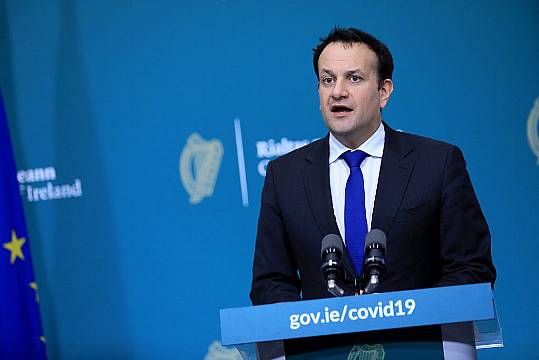Tánaiste Leo Varadkar has said he expects to see rents falling within the next couple of years.
Mr Varadkar said recent moves by the Government to tie the level of rent increases to inflation were effectively a “rent freeze”, and should result in lower rates in the coming years.
He also backed calls for increased capital investment in housing, but said it must be balanced against competing interests such as schools, hospitals and climate change.
Speaking on Monday, he said: “In the last couple of weeks, I think we’ve seen a lot being done in housing.
“We’ve seen the LDA (Land Development Agency) being established, we’ve seen in effect a rent freeze, rents are now linked to inflation.
“We know that wages are rising faster than inflation. So in real terms, we’d expect to see rents falling over the next couple of years. Falling at least for people who were renting already.”
At a recent party Ard Fheis, the Fine Gael leader set a target of doubling the number of houses built each year from 20,000 to 40,000.
He said a combination of public and private investment will be needed to reach the goal.
“It’s my view that we need to roughly double the number of new homes being built in Ireland every year from about 20,000 to 40,000 a year in the future,” he said.
“I understand, and I think most people understand, that you can’t do that in one year. But I think we should be aiming to get to 40,000 a year over a number of years.
“There’s no way we can achieve that without both increased public investment and increased private investment.”
Mr Varadkar agreed with recent analysis from the Economic and Social Research Institute (ESRI) calling for capital investment in housing to be doubled to €4 billion a year to tackle the state’s housing crisis.
But he said the Government has to balance that advice against the need for investment elsewhere.
He said: “What the ESRI recommends is that we should be willing to borrow more, we should be willing to close the deficit a little bit slower, in order to facilitate greater investment in social housing and public housing. I agree with that analysis.
“But what I think ESRI reports didn’t do is what governments have to do. And that is to recognise that there are other demands for capital investment as well. We need to build new hospitals, too. We need to build new schools as well. We need to invest in climate action.
“One of the difficulties, I suppose, with any report coming from any agency, is it doesn’t often look at that wider picture that governments have to.
“Yes, we need to invest more in public housing. And yes, that might require additional borrowing that we hadn’t otherwise previously intended.
“But bear in mind that any money that Government spends is an opportunity cost, it’s money that didn’t go into a primary care centre. It’s money that didn’t go into a new school, it’s money that hasn’t can’t go into climate action. And we have to balance those competing demands all the time.”
Mr Varadkar said the public had made clear that public investment in housing should be a priority.
“They want to prioritise housing when it comes to capital investment and that’s what we will do,” he said.
“I have no doubt that we’ll have another report from ESRI in a few months’ time suggesting that we borrow more for something else, and another one saying that we’re borrowing too much.
“That’s the nature of these things. Government has to see these things in the round and that’s we do.”







